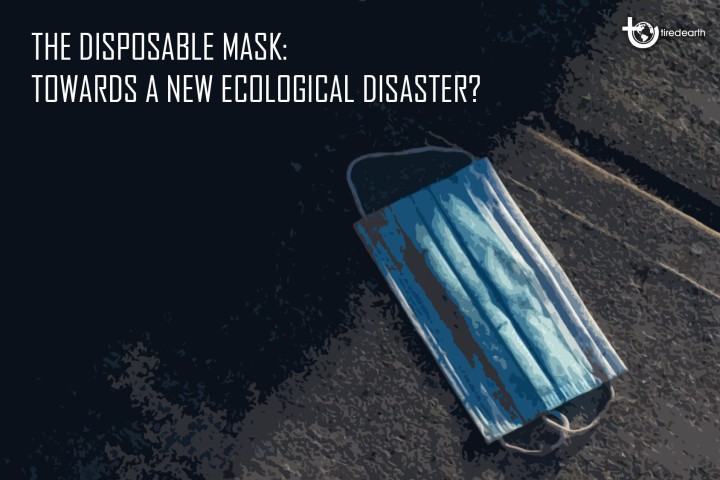The disposable mask: towards a new ecological disaster?

The first gesture, the first reflex: do not throw your mask on the floor!
1) Wearing the mask is mandatory
Everywhere in France, in order to avoid an epidemic rebound and in addition to the application of barrier gestures, the extension of the scope of the health measures was necessary Especially, the wearing of masks is now mandatory in public places, enclosed spaces... and now at school from the age of 6.
Obviously, we must be vigilant together to fight against the spread of the epidemic by wearing this mask which is an essential protection against the coronavirus, as confirmed by many doctors.
However, the question of recycling these masks - let us remember that France ordered more than two billion of them in the spring of 2020 – legitimately arises because, in just a few months, a new source of pollution has appeared! And, like all pollution, it will have - it already has - very harmful impacts on the environment and biodiversity.
2) Non-recyclable disposable masks?
The single-use mask becomes, in four hours, a waste that must not be thrown on the ground or deposited in the yellow bin (intended for packaging and paper). It finds its place in the “all-around” trash1, the one in which we put our usual household waste which will be incinerated, most often because there is no sorting chain.
In the public space, there is currently no specific receptacle for the collection of single-use masks, unlike in hospitals. For good reason, they are not yet recycled, even if processes are currently being tested for this purpose.
These non-recyclable masks (sometimes contaminated by COVID-19), we find them on the ground in the streets and on the sidewalks of our cities, in nature. They will end up in water collection circuits, in the ocean, or even be ingested by birds or fish and eventually returned to the transmitter on our plates, through the food chain.
3) An ecological disaster on the scale of France, on the scale of the world?
Yes, in all probability and taking into account current studies. Made from thermoplastics (polypropylene, a petroleum derivative), disposable masks are not biodegradable and take several hundred years to degrade, having having in the meantime emitted thousands of microplastic particles.
To understand the magnitude of the problem, one must imagine that each French person who uses two masks per day contributes to producing 400 tonnes of waste a day. These are millions of masks transformed into waste every day. Millions of masks per day! And how much per month, per year? An immeasurable amount on the scale of a city, a country.
It now seems likely that if the health crisis continues with identical health restrictions and the requirement to wear a mask, we are facing a health and ecological catastrophe, perhaps even before the end of the pandemic.
4) What actions have been taken?
The first gesture, the first reflex: do not throw your mask on the floor!
The issue of reusing single-use masks is not clear. Indeed, according to some sources, they can be machine washed (at least 30 minutes at 60 ° minimum), up to 10 times maximum. Still subject to several studies but not validated by the authorities, this practice helps to limit pollution.
The most recommended alternative is the use of fabric masks, reusable, less polluting and more economical. Many municipalities, including that of Puteaux, have offered them to their citizens. This is a first encouraging gesture.
But is it enough?
We must promote local initiatives, multiply targeted awareness and information campaigns on the pollution of disposable masks, support them with solutions supplementing the distribution of masks: collection points, partnerships, associative initiatives ...
Collective and citizen reflection around the collection of masks becomes indispensable. How to collect them? How to recycle them? How to avoid an ecological disaster in a context of health crisis?
This crisis highlights the interdependence of humanity and all forms of life with nature: everything is linked. It is therefore our individual and collective responsibility to become more responsible and more aware of the consequences of our actions and our choices.
It is the political responsibility of elected officials to support the emergence of a new civic and ecological consciousness.
Sources:
https://www.ademe.fr/
https://www.zerowastefrance.org/masques-halte-au-jetable/
https://www.hcsp.fr/Explore.cgi/avisrapportsdomaine?clefr=902
https://news.un.org/en/story/2020/07/1069151
https://www.natura-sciences.com/sante/reutiliser-masques-usage-unique-risques.html
https://www.numerama.com/sciences/629542-masques-jetes-dans-la-rue-quel-impact-sur-lenvironnement.html
https://solidarites-sante.gouv.fr/IMG/pdf/fiche_covid19_dechets_contamines_elimination_particulier_20200323_vf.pdf
https://www.leparisien.fr/video/video-covid-19-une-start-up-recycle-les-masques-usages-en-matiere-plastique-27-08-2020-8374083.php

